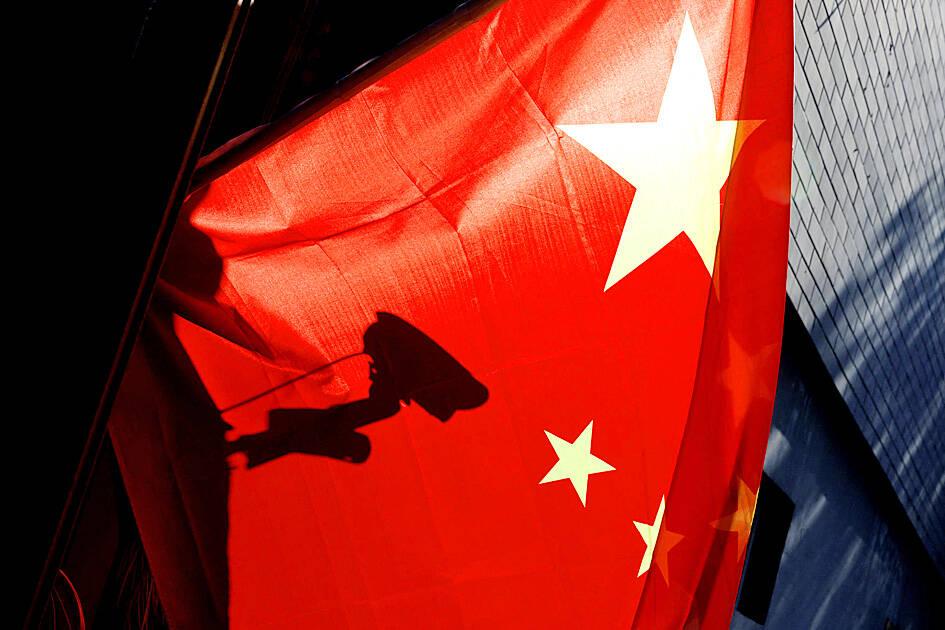Two brothers and eight active service members were handed sentences ranging from 30 months to more than 10 years today for spying on behalf of China.
The Tainan branch of the High Court sentenced two brothers surnamed Hsu (諜) to seven years and 10 months and seven years and four months respectively, while the eight service members received sentences ranging from two-and-a-half years to 10 years and two months.
Starting in 2021, the Hsu brothers made several trips to Macau and Zhuhai in China’s Guangdong Province, where they set up companies as a front for collecting Taiwanese military intelligence, prosecutors said.

Photo: Reuters
In January 2022, the brothers recruited a man surnamed Sun (孫), who was sentenced to five years and six months in prison, and 12 others to bring active-duty service members into the scheme, prosecutors said.
The brothers posted loan advertisements for military personnel and worked with pawnshops to target service members in need of money, they said.
In return for photographs of their military ID cards and military secrets smuggled out of bases, soldiers were bribed with the equivalent of up to one month’s pay, prosecutors said.
The Hsu brothers and Sun would then send the information to their contact in China, a man called “Brother Long” (龍哥), prosecutors said.
The brothers received more than NT$3.97 million (US$132,750) in illegal funds for their work, prosecutors said, adding that Sun made more than NT$266,000 and the eight service members made between NT$10,000 and NT$190,000.
The eight service members came from the army, navy, air force and coast guard, were active nationwide and included officers as well as soldiers, they said.
Prosecutors launched an investigation in April last year, carrying out four waves of searches across 29 locations and questioning 49 people before holding the main suspects incommunicado.
In their search, prosecutors seized nine pieces of confidential military information and one classified document.
The Hsu brothers were among 15 people accused of breaching the National Security Act (國安法), while the service members were also prosecuted for contravening the Criminal Code of the Armed Forces (陸海空軍刑法) and the Anti-Corruption Act (貪污治罪條例).
The sentences can be appealed.

US President Donald Trump said "it’s up to" Chinese President Xi Jinping (習近平) what China does on Taiwan, but that he would be "very unhappy" with a change in the "status quo," the New York Times said in an interview published yesterday. Xi "considers it to be a part of China, and that’s up to him what he’s going to be doing," Trump told the newspaper on Wednesday. "But I’ve expressed to him that I would be very unhappy if he did that, and I don’t think he’ll do that," he added. "I hope he doesn’t do that." Trump made the comments in

A cold surge advisory was today issued for 18 cities and counties across Taiwan, with temperatures of below 10°C forecast during the day and into tonight, the Central Weather Administration (CWA) said. New Taipei City, Taipei, Taoyuan and Hsinchu, Miaoli and Yilan counties are expected to experience sustained temperatures of 10°C or lower, the CWA said. Temperatures are likely to temporarily drop below 10°C in most other areas, except Taitung, Pingtung, Penghu and Lienchiang (Matsu) counties, CWA data showed. The cold weather is being caused by a strong continental cold air mass, combined with radiative cooling, a process in which heat escapes from

Tourism in Kenting fell to a historic low for the second consecutive year last year, impacting hotels and other local businesses that rely on a steady stream of domestic tourists, the latest data showed. A total of 2.139 million tourists visited Kenting last year, down slightly from 2.14 million in 2024, the data showed. The number of tourists who visited the national park on the Hengchun Peninsula peaked in 2015 at 8.37 million people. That number has been below 2.2 million for two years, although there was a spike in October last year due to multiple long weekends. The occupancy rate for hotels

Snow this morning fell on Alishan for the first time in seven years, as a strong continental cold air mass sent temperatures plunging across Taiwan, the Central Weather Administration (CWA) said. The Alishan weather station, located at an elevation of about 2,200m in central Taiwan, recorded snowfall from 8:55am to 9:15am, when the temperature dropped to about 1°C, the CWA said. With increased moisture and low temperatures in the high-altitude Alishan area, the conditions were favorable for snow, CWA forecaster Tsai Yi-chi (蔡伊其) said. The last time snow fell at the Alishan weather station was on Jan. 10, 2018, while graupel fell there